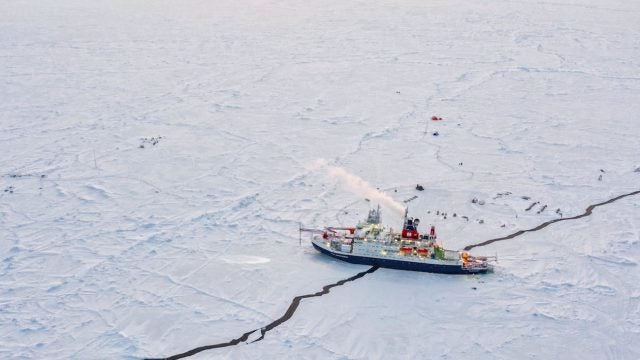Title: COVID-19 Yields a Sharper Picture of China-Taiwan Relations
The COVID-19 pandemic has seen an escalation in tensions across the Taiwan Strait. Although the foundational aspects of the status quo remain intact, the pandemic has weakened them across the board. The current situation highlights a shrinking window for diplomatic intervention that decision makers in Beijing and Taipei, and the incoming Biden Administration must bear in mind.
On December 31, 2019, the Wuhan Municipal Health Commission posted a message on its website detailing a mysterious “viral pneumonia” emerging in the city. This information, picked up by the World Health Organization’s (WHO) country office in China, became the first official statement to alert the world to the oncoming COVID-19 pandemic. Near the beginning of the outbreak, however, one hopeful sign emerged: Beijing respected a 2012 cross-strait medial agreement, allowing two Taiwanese medical specialists to travel to Wuhan and learn about the virus firsthand. While Beijing and Taipei had suffered tensions after Tsai Ing-wen became president of Taiwan in 2016, this move suggested a gesture of goodwill from China. Even as the outbreak grew severe, some suggested that a common and imminent public health threat like COVID-19 would present an opportunity to improve cross-strait relations.
A few months later, however, the pandemic has only served to sharpen tensions between China and Taiwan. Far from seizing the advent of COVID-19 to pursue rapprochement, leaders on both sides of the strait have retreated from cooperative efforts. Embarrassed by its initial mishandling of the outbreak and confident after its subsequent successes in bringing it under control, Beijing increased its military activity in areas where it has territorial claims. In mid-March, the People’s Liberation Army (PLA) began a campaign of flying warplanes across the Taiwan Strait. These actions were matched with a nuanced but significant shift in official rhetoric about Taiwan. In his remarks at the start of the Two Sessions meetings in May, Premier Li Keqiang omitted the need for specifically “peaceful” reunification with Taiwan, departing from nearly four decades of standard expression. While the phrase of peaceful reunification later reappeared, the Fifth Plenum of the nineteenth Communist Party Central Committee featured more blunt discussion about reunification with Taiwan than it had in previous years. In October, the PLA’s Eastern Theater Command, the division poised to lead an invasion of Taiwan, released videos on social media depicting soldiers entering active combat. There is a chance that these actions represent a desire to boost citizen morale in otherwise uncertain times rather than a genuine intention among China’s leaders to pursue war. Nevertheless, they have escalated Taiwanese and global concerns about a military invasion from the mainland.
For Taiwan, the pandemic has given the ruling Democratic Progressive Party (DPP) an opportunity to demonstrate its competence in addressing the pandemic and increase citizen trust in government. Upon receiving initial notification of the virus from the WHO in late December, Taiwan immediately raised concerns about the potential for human-to-human transmission, a reality that the WHO only recognized in late January. Accustomed to tension with Beijing and compromised access to the WHO, Taiwanese political leaders opted for self-reliance in addressing COVID-19. Using a combination of early response, centralized management, effective communication, proactive quarantine and contact tracing, and prevention measures (such as mask and distancing mandates), Taiwan was among the best globally in addressing the COVID-19 pandemic. Once predicted to have one of the worst outbreaks in the world, it has recorded less than 700 confirmed cases and seven deaths from COVID-19 and has had no cases of domestic transmission since April 12. It also managed the pandemic with few disruptions to its society and economy—widespread school and business closures and quarantine orders that brought life to a standstill for large swaths of the mainland were not imposed in Taiwan. These policies translate into gains for President Tsai Ing-wen, whose DPP supports Taiwan’s status quo as a de facto independent state from China without de jure statehood. While Tsai’s approval recently dipped amid controversy over lifting restrictions on US meat imports, it generally has been high throughout the pandemic, reaching 68.5 percent in February and 73 percent in May. These favorable ratings show that COVID-19 has cemented the gains made for the DPP during the 2019 Hong Kong protests, when Beijing’s disregard for the “one country, two systems” governance model cooled Taiwanese enthusiasm for closer relations with the mainland. Perhaps a sign of more enduring change, the KMT, which previously supported the One China Policy as specified in the 1992 consensus, has backed away from this position, demonstrating that Taiwan’s political center of gravity has shifted away from the mainland regardless of party affiliation.
Amid the coronavirus pandemic, the Taiwanese public has also expressed increased support for a unique Taiwanese national identity. China’s reputation as the origin of the outbreak and the pandemic’s massive ramifications for both China and the world doubtless enhance the argument for Taiwan to disengage with China, even at the level of individual identity. According to a February survey from the Taiwan Public Opinion Foundation, 83.2 percent of individuals sampled identified as exclusively “Taiwanese”—the highest proportion recorded since the first such survey was completed in 1991. In September 2019, following a summer of protests in Hong Kong, that number was 72.1 percent—hardly a single point higher than it had been in January before the Hong Kong protests. Moreover, in a survey on Taiwanese willingness to engage in war, 77.6 percent stated they would be willing to fight if Taiwan faced a Chinese attack. That COVID-19 has engendered a larger increase in Taiwanese identity than that seen during the Hong Kong protests and produced willingness to fight in a war again testifies to the profound impact of the pandemic on cross-strait relations.
On the global stage, Taiwan has seized the pandemic to showcase its value in an era when it has otherwise seen its number of formal partners decline and Beijing’s geostrategic importance rise. Following Taiwan’s success in managing the outbreak, the Taiwanese Ministry of Foreign Affairs has promoted the “Taiwan model” on disease prevention. In August, US Secretary of Health and Human Services Alex Azar led a delegation to Taiwan to learn about its health system, making him the highest-level US official to visit Taiwan since 1979. While the Trump administration’s continued mismanagement of COVID-19 suggests that this trip occurred for political rather than medical purposes, it nonetheless lends the DPP international legitimacy. Unburdened with domestic COVID-19 cases at home, Taiwan also coordinated a medical aid program that has donated fifty-three million masks abroad since April. Amid Taiwan’s display of competence and responsibility, the Netherlands upgraded the name of its diplomatic office in Taiwan, and France resisted Chinese attempts to thwart an arms sale with Taipei, encouraging China to focus on the coronavirus instead. Citing the pandemic, countries and medical organizations have lobbied the WHO to reinstate Taiwan’s observer status at the World Health Assembly, which the WHO secretariat removed in 2017 under pressure from China. During the pandemic, the United States has experienced a surge in public support for defending Taiwan in the event of an invasion as well as discussion of the merits of “strategic clarity”—the idea that the United States should explicitly state its military support for Taiwan rather than remaining ambiguous on the matter. Europe, while not going so far as to debate military action, has renewed conversations on how to best assert its interest in Taiwan’s future as a democratic state. While not a universal salve for its concerns about international legitimacy, Taiwan’s actions as a result of COVID-19 enhance its position and recognition on the world stage.
Ultimately, COVID-19 yields an image of the cross-strait relationship that is not fundamentally different from before but highlights a shrinking window for diplomatic intervention. Though weakened, the foundational underpinnings of the cross-strait relationship remain intact: China has not renounced its commitment to peaceful reunification, Taiwan has not publicly challenged the status quo in its push for independence, and the United States has not fundamentally altered its policy on Taiwan. At the same time, the pandemic has engendered China’s growing affinity for displaying military force, Taiwan’s shrinking constituency for the 1992 consensus, and the international community’s renewed focus on Taiwan’s future, including calls for explicit military support in the United States. These trends point to a more precarious future for the cross-strait relationship in the post-COVID-19 world, a reality that Taiwan, China, and future US administrations must bear in mind when crafting policies for the Taiwan Strait.
. . .
Yanzhong Huang is a senior fellow for global health at the Council on Foreign Relations and a professor at Seton Hall University School of Diplomacy and International Relations. His research primarily focuses on global health and China. His new book, Toxic Politics: China’s Environmental Health Crisis and its Challenge to the Chinese State, was published in October 2020.
Lucy Best is a research associate in Asia Studies at the Council on Foreign Relations. Her research interests include Chinese politics, environmental policy, and US-China relations.
Recommended Articles

Critical maritime infrastructures (CMI), and in particular undersea communication cables, are increasingly under threat of attacks by malign actors who benefit from asymmetric capabilities and jurisdictional complexities in the maritime…

This article explores how the Palestinian crisis and the death of the two-state solution endangers the Hashemite Kingdom of Jordan. It illuminates the complicated relationship between Jordan, Israel, and Palestine…

This article explores the uncertain future of Arctic governance amid shifting global geopolitics. It argues that whether Washington and Moscow opt for confrontation or cooperation, multilateralism in the Arctic…